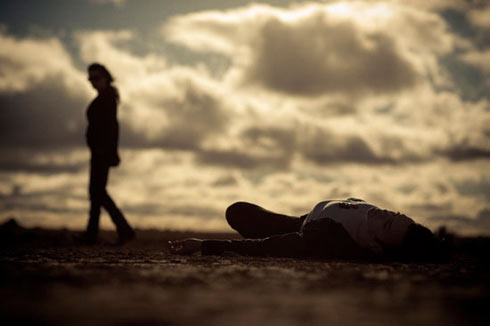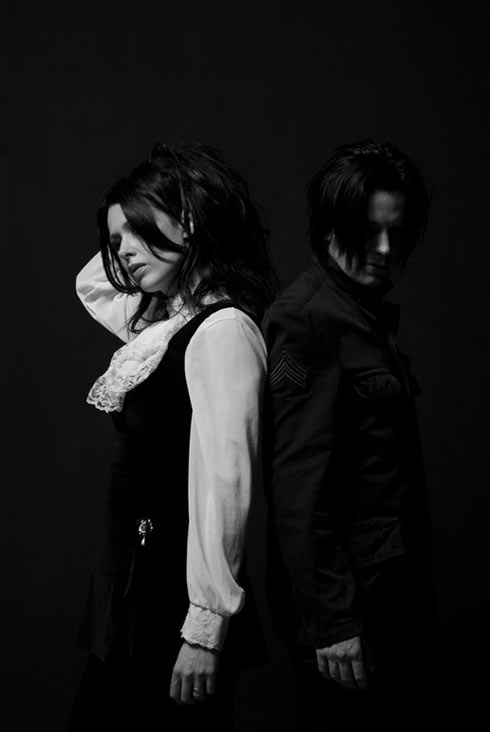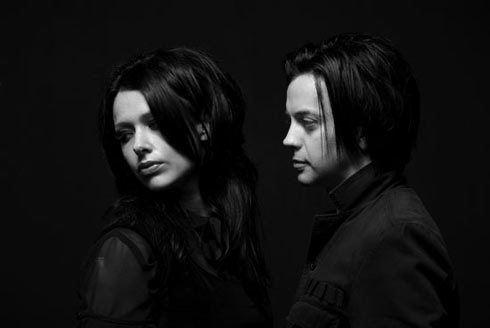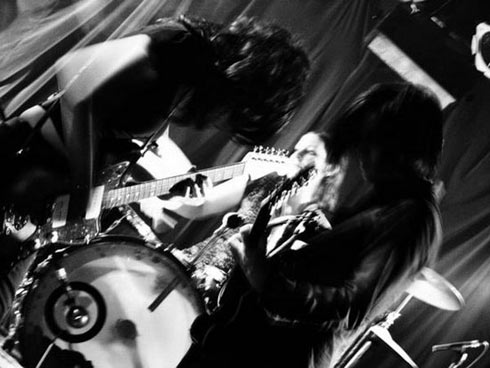Breaking Free



 Text: Digby Woods Images: Stefan Duscio, Michael Spiccia & Synaesthesia
Text: Digby Woods Images: Stefan Duscio, Michael Spiccia & Synaesthesia
The Black Ryder was birthed in 2007, the musical love child of Sydney-based Aimee Nash and Scott von Ryper. They immediately set about crafting an entirely new sound, one that could be separated from the vagaries of whatever critics think ‘post-psychedelic’ is. 2008 saw them launched into the public eye, with a slew of coveted support acts for the likes of The Brian Jonestown Massacre, Black Rebel Motorcycle Club, The Charlatans and The Raveonettes. At the end of 2009, they released their much-anticipated debut album, Buy The Ticket, Take The Ride, cementing their reputation as a force to be reckoned with. Don’t look now, but a new decade is underway and The Black Ryder looks poised to do some damage.
Digby Woods: You just came back from playing at Playground Weekender. How did that go?
Scott von Ryper: The festival was a great place to hang out, I don’t know if it was as well populated as they would’ve hoped, but it feels pretty good when you’re walking around and it’s not too crowded. The show felt great though.
DW: How did you come to choose the name The Black Ryder? Is there some deeper significance that the general public isn’t aware of?
SCR: It’s influenced from Tom Waits’ ‘Black Rider’. It’s a stage production, almost a musical. Tom Waits did the music and William S. Burroughs did the writing, and it’s quite an amazing kind of production. So we’re influenced by that a little, and basically Aimee (Nash) came up with the name and it’s something that just felt right.
DW: Speaking of influences, your album title, Buy The Ticket, Take The Ride, is obviously inspired by Hunter S. Thompson’s classic, Fear and Loathing In Las Vegas. Are both of you big fans of his then?
SVR: Yeah, both Aimee and I are big Hunter fans. It just seemed to make sense and fit in with what was going on with us at the time, and how the whole [album] kind of got put together.
DW: Does Hunter’s philosophy apply only to your creative process or do you subscribe to it in your everyday lives as well?
SVR: Well, I think it applied to our creative process and in a way the non-creative side of putting a musical project together.
DW: Musical project?
SVR: At the time I didn’t say ‘band’ because it wasn’t a band when we started, it was really just a recording project. Aimee and I started, and then other people got involved as they came by the studio. When we started we didn’t have any backing or anything, and we pretty much just launched into recording thinking they could be demos, and we kind of just kept making it happen along the way and turning that into the album. And to be honest it wasn’t until very late in the game, when the album was pretty much finished, that we finally found someone that we were happy with, that was going to put it out. But it was really just us on our own for a long time.
DW: But then you struck a deal between EMI Australia and your managing company, Original Matters, that allowed you complete creative as well as distributive and marketing control over your music. Did this take a while to put together?
SVR: From the idea of it to when it finally happened, no, it didn’t, not in the scheme of things. It did happen on the tail end of things though, we weren’t lucky enough to strike midway through the process. We went through a lot of ups and downs in terms of people wanting to get on board, getting behind the album, and then once we started talking to them, we just didn’t feel like it was the right thing.
So there were lots of ups and downs through the recording process, which can be quite distracting if you let it be. In the end we were just so thankful, because our original vision was to release something on our own label (The Anti-Machine Machine), and we did that, but with the benefit of having the distributive power of a major (label) behind us.
DW: Was Original Matters already in play with EMI, or did you have to shop around first?
SVR: Yeah, they have ties with EMI in terms of some of the other artists they manage, so I guess that was the other reason why it wasn’t as hard as it could have been, because there was a lot of trust going on between some of those blokes at the company (EMI) and some of our folks, so a lot of the game playing just didn’t need to happen. What they said was what they did, and the same on our side, and that’s all we ever ask for. It’s amazing though how often that just wouldn’t happen. So, yeah, there were ties in place, which made it that much easier.
DW: So was that a refreshing experience from what you’d had to deal with in the past?
SVR: [Laughs] Yeah, it’s always refreshing when you meet people on the business side and they feel completely genuine, and you find out that they are, and they mean what they say and do what they say. Unfortunately it just doesn’t happen a lot. So it’s great when you do meet those people.
DW: Your album has created a lot of buzz with both the public and the critics, but you were introduced to the world as a ‘live’ band, opening for Brian Jonestown Massacre and Black Rebel Motorcycle Club. Was there a certain pressure then to make the album live up to the hype that had been created?
SVR: It was more inspiring than anything else, for two reasons: one, because it was the first time people had heard our stuff and it really inspired us to get back in the studio and get cranking again on the rest of the album, and two, it inspired us in terms of what we learnt in the rehearsal room versus the studio. That allowed us to go back with a fresh set of ears and work out what we could tune up or what we could do differently. And sometimes it’s not until you play those songs to a live audience that you can feel whether it works or not. It definitely made a difference.
DW: Now that your album is out though, you must have the pressure of expectancy on you, like, “What’s your next move?” or “What sound are you working on now?” How are you finding that?
SVR: There’s a massive pressure, as soon as (the album) comes out, because there’s such a short time frame on everything now. On the business side of it, we just want to focus on releasing the album in as many places a possible, and on the creative side we want to play in all those places. So it never really stops, you can never get to that point where you say, “Okay, the album’s done, now we can just sit back and relax and hope people like it,” because there is always something going on. It’s quite healthy though, because if you just sat back and waited, and your whole satisfaction was based on what people thought of it, then you might be in a bit of trouble if people didn’t think too much of it.
DW: Do you think you’d be in the same position now if BRMC hadn’t come along and forced you to get the band together, in a sense?
SVR: It’s hard to say whether it would’ve happened in the same time frame. I think whenever something like that happens, where an opportunity arises and you’re given a deadline when you didn’t really have a deadline before, other than the one you’ve given yourself, it definitely spurs you on. It you’d been working for a year already on sounds and toying around in the studio, it’s very easy to lose that urgency of finishing. You don’t want that urgency, but sometimes it’s good for something to come along and give you a bit of a kick up the arse.
DW: As an artist, you just want to keep experimenting and building on something, and you don’t know when to stop, right?
SVR: For sure, and those bands that we played with, a lot of them were bands that we knew, or knew of, who had asked us to play with them and had never seen us, so of course we wanted to make sure that we played really well. So that was really inspiring as well, it gave us that drive.
DW: Your sound has been described as a mixture of psychedelic and shoegaze, however, certain songs such as ‘The Greatest Fall’ and ‘Sweet Come Down’ show a clear country/blues influence.
SVR: Well, those two songs in particular are so incredibly out there, in terms of being labelled as a psychedelic, shoegaze band, and I actually enjoy that, because if anyone were to try and label us as simply that, these songs provide a clear retaliation to those people thinking we just do that kind of sound.
We get a lot of comments quite often, because it goes both ways. There are people who are very much into psych/shoegaze music who would hear ‘Sweet Come Down’ and think it’s quite radical, and at the same time, people who don’t know that kind of genre at all would listen to ‘Sweet Come Down’ and love it, and then be drawn further into our evil world, the one that could be labelled as more traditional psychedelic/shoegaze music. I’d like to be responsible for that, to bring a few people across that weren’t initially into that genre.
DW: ‘Sweet Come Down’ is quite a literal title when looking at the overall soundscape of the album, as it provides just that effect from the previous guitar-belting of the first few tracks. How much attention was paid to the album’s emotional flow?
SVR: The flow of the album was quite important now that we think about it because there are quite a number of different feelings on that album, we wanted to have that road-trip feel, that slow come down at the end.
To me, ‘The Greatest Fall’ is a ’50s track with this dark kind of feeling, and then ‘Sweet Come Down’ is a very dark country track, and then it moves into something, not psychedelic, but kind of trippy in a way, like ‘Burn & Fade’ and ‘Rise’. So the flow is important to make sure it all fits together well.
DW: How did ‘Sweet Come Down’ come to be chosen as the song for your video debut?
SVR: Well, we decided very early on that we didn’t want to do singles, and we really felt that the album needed to be treated as a whole. For ‘Sweet Come Down’, both Aimee and I, and the director, Michael Spiccia, had a clear vision of what the visual aspect of that track should be, more than some of the others. To me, what we ended up with in terms of the visual aspect of the song, was exactly spot on to what it should have been. We’re all really happy with it, and Michael just nailed it in getting the feeling of the song.
But you’re right, certain people would wonder why we would go out and make a short film for that song, and I guess it was partly to be a little bit confronting, because it’s not what people would expect. In another way, it was the perfect visual element and introduction to the band. It kind of says straight up, “We are not what you’ve heard and not what you expect.”
DW: In saying that, do you feel that ‘Sweet Come Down’ is representative of the album as a whole?
SVR: I’d probably have to say, no, it isn’t, but I think that without it the album would not be what it is. I think it was an important element to have in the album, but it’s certainly not a great representation on its own of what the album is.
DW: Your album has a seamless quality to it, in that while each of your songs is singularly crafted, such that they clearly stand out from each other, I was still able to listen to the entire album as if it was one song.
SVR: Well, that’s a really great compliment to us, because that’s exactly what we wanted to do, and to be honest, we spent a lot of time crafting it, not only each individual track, but also understanding how those tracks work with each other and thus represent the album as a whole.
So, as I said, to hear people actually come out and say that, or when I see a review that doesn’t get put off by the fact that (the album) may go into different territory, then that’s very satisfying for us. It could’ve gone either way I guess, but we just decided that was what we wanted to do and we hoped that people would want to take that trip with us.
DW: I can’t imagine this kind of paradoxical production was unintentional, was it?
SVR: Certainly not, I think right from the start, the first three songs that Aimee and I wrote together were all incredibly different from each other, and we were confronted with this possible problem of “What does this thing sound like?” and “Which one of these songs is the sound of the band?” and “What should we decide to try and do for the future?” Or should we just ignore that, just keep going and hope that everything kind of sits in well together and thus by doing that we’re creating something new? Obviously we decided to take the latter approach and that’s the way we went.
DW: And that obviously influenced your ‘no singles’ approach?
SVR: Well… yeah, I mean, being in previous groups and understanding some of the pressures you go through when you are being asked to do radio singles and focusing everything on one track, it’s something that we learnt we didn’t want to do again. That’s why we went out there right from the start and said, “This is what we want to do.” We didn’t want to try and be a radio band, or a singles band, we just wanted to try and make a really good album.
DW: I know we already discussed genres, but it seems like there has been a revival of the kind of psychedelic/shoegaze sound, not only in Sydney, but Australia as a whole. Do you think this gives credence to the idea that psychedelic music is a revivalist genre?
SVR: I actually agree with you. When Aimee and I were playing in our previous group before this (The Morning After Girls) we spent a lot of time touring overseas, and it was something that was quite apparent to us when we returned home after a good period of time that the scene had changed quite significantly. There are a lot of bands here in Sydney that are playing music that we really love, and I guess you could be right in that there was some kind of revival of that kind of genre.
Certainly I didn’t feel that there was much going on in that way before, we were spending so much time overseas, but when we came back it felt like there was a lot going on. And I still feel that, it doesn’t feel like it has reached its peak and dissipated. It just feels like something amazing happened and a lot of great people found each other. I think that is what it’s all about really, that there are people who have probably always loved this music but something magical happens at some point where these people find each other and get together and form bands, and then those bands meet each other and then those band members form side projects, and the side projects form side projects, and all of a sudden you have a scene.
That’s kind of what I feel has happened here and is still happening. So despite the issues we have in Sydney with live music venues and all sorts of stuff, and Melbourne as well, the scene has survived and thrived and is getting bigger.
DW: It seems like a very co-operative genre.
SVR: Very, and that’s something we discovered for the first time when we were touring overseas with our previous band, that there’s this great community and family of people that share this love, and you can travel anywhere and if you’re into that music, they just accept you with open arms and they want to listen to your music and put you up in their house. It’s quite incredible, to be honest, and it’s a great feeling.
The Black Rider’s debut album, Buy The Ticket, Take The Ride, is out now through EMI Records.
Next story: And So The Story Goes… – Self Titled



